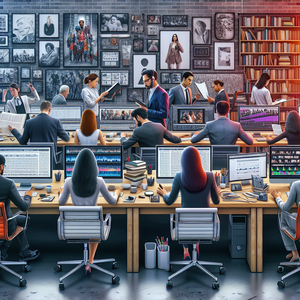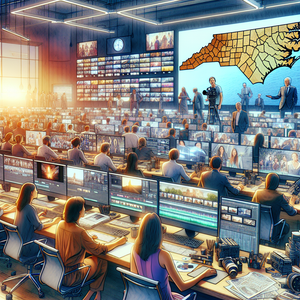
Discovering 15 Distinct Editing Careers: Roles, Responsibilities, and Essential Skills
The realm of editing is a dynamic and diverse field, encompassing a range of roles that significantly enhance the clarity, coherence, and quality of written content. From developmental editors who focus on shaping a manuscript's structure to copy editors who ensure grammatical precision, the spectrum of editing careers reflects the transformative nature of publishing and content creation. This article explores 15 unique editing roles, detailing their key responsibilities, necessary skills, and the importance of each position within the broader publishing ecosystem.
Job Summaries:
Content Editor:
- Content editors are instrumental in crafting narratives that resonate with readers while aligning with a publication's objectives.
- They collaborate with writers to refine concepts, enhance clarity, and often rewrite sections for improved flow.
- A bachelor's degree in English, journalism, or a related discipline is generally required.
- Excellent communication skills and a meticulous eye for detail are essential.
Copy Editor:
- Focusing on the nitty-gritty of language, copy editors strive to correct grammatical errors.
- Ensure style consistency.
- Enhance overall readability.
- Tasks involve fact-checking and adhering to specific style guides.
- A background in English or journalism is often necessary.
- Proficiency in editing software is often required.
Developmental Editor:
- Developmental editors take a broader view of manuscripts, guiding authors through structural and thematic elements.
- They evaluate story arcs, character development, and pacing, providing revision suggestions that enrich the narrative.
- This role typically requires prior experience in writing or editing, along with strong analytical skills.
Proofreader:
- Serving as the final checkpoint before publication, proofreaders identify typographical errors, punctuation mistakes, and formatting issues.
- A keen eye for detail and a solid grasp of grammar are essential for this role.
- While formal education requirements may vary, proofreaders play a crucial part in ensuring high standards in published materials.
Technical Editor:
- Specializing in complex documents such as manuals and scientific publications
- Technical editors ensure clarity and accuracy for non-expert audiences
- A background in a specific technical field is typically necessary
- Strong writing and editing skills are typically necessary
Freelance Editor:
- Freelance editors operate on a project basis.
- They offer their services to authors, businesses, and publishers.
- They may specialize in different editing types.
- They enjoy the flexibility of selecting clients and projects.
- Strong self-management and marketing abilities are key.
Managing Editor:
- Managing editors oversee the editorial process within publications.
- They act as a liaison between writers, editors, and other departments.
- Their responsibilities include setting deadlines, approving articles, and maintaining quality standards.
- A degree in journalism or communications is usually required.
- Considerable editorial experience is usually required.
Editorial Assistant:
- Editorial assistants provide crucial support to editors through research, proofreading, and managing submissions.
- They often handle administrative tasks and maintain organized records of manuscripts.
- Typically, a degree in English or a related field is preferred.
Photo Editor:
- Photo editors select and edit images that complement written content.
- They collaborate with photographers and writers to ensure visuals align with the publication's style and message.
- Proficiency in photo editing software is essential.
- A solid understanding of copyright and licensing is essential.
Editor-in-Chief:
- As the highest-ranking editorial position within a publication, the editor-in-chief shapes the overall vision, direction, and content strategy.
- This role involves making high-level editorial decisions, managing the editorial team, and representing the publication to external stakeholders.
Associate Editor:
- Supporting the editor-in-chief and managing editors
- Associate editors oversee specific sections or content types
- They review submissions
- Provide feedback
- Ensure adherence to publication standards
- A background in editing is necessary
- Strong organizational and communication skills are necessary
Line Editor:
- Line editors focus on refining the textual elements of a document.
- Enhancing clarity and coherence while preserving the author's voice.
- Strong writing skills are crucial for this role.
- A deep understanding of language nuances is crucial for this role.
Legal Editor:
- Specializing in the editing of legal documents such as contracts and briefs
- Legal editors ensure accuracy and compliance with legal standards
- A degree in law or substantive experience in legal writing is typically required
Beta Reader:
- Beta readers offer feedback on manuscripts from a reader's perspective before publication.
- They assess pacing, character development, and overall engagement.
- Formal qualifications are not necessary for beta readers.
- A deep passion for reading and storytelling is essential.
Fact Checker:
- Fact checkers verify the accuracy of information in articles, books, and other publications.
- They research facts, cross-reference sources, and ensure that claims are substantiated.
- Strong research skills and meticulous attention to detail are essential.
The editing profession presents a rich array of roles, each catering to different interests and skills, all contributing to the enhancement of content quality across numerous platforms. For those considering a career in editing, exploring these diverse opportunities can lead to fulfilling paths within the literary and digital landscape.
Explore More Jobs

